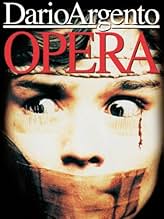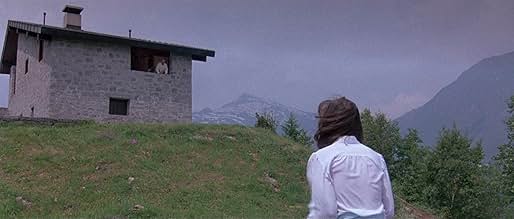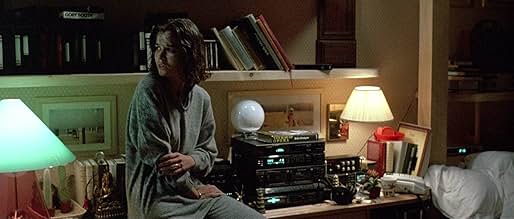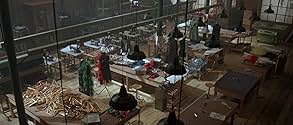IMDb-BEWERTUNG
6,9/10
21.076
IHRE BEWERTUNG
Eine junge Opernsängerin wird von einem geistesgestörten Fan verfolgt, der davon besessen ist, alle Personen aus ihrer Umgebung zu töten, um sie alleine zu besitzen.Eine junge Opernsängerin wird von einem geistesgestörten Fan verfolgt, der davon besessen ist, alle Personen aus ihrer Umgebung zu töten, um sie alleine zu besitzen.Eine junge Opernsängerin wird von einem geistesgestörten Fan verfolgt, der davon besessen ist, alle Personen aus ihrer Umgebung zu töten, um sie alleine zu besitzen.
- Auszeichnungen
- 4 Nominierungen insgesamt
Coralina Cataldi-Tassoni
- Giulia
- (as Coralina Cataldi Tassoni)
Antonino Iuorio
- Baddini
- (as Antonio Juorio)
György Gyõriványi
- Miro
- (as Gyorivany Gyorgy)
Dario Argento
- Narrator (Italian version)
- (Synchronisation)
- (Nicht genannt)
Empfohlene Bewertungen
Understudy, Betty (Cristina Marsillach) gets her big break, getting to star in a modern stage production of Verdi's Macbeth, after the volatile, original singer gets hit by a car. Betty is nervous, but nails the part. Of course, OPERA is a Dario Argento film, so Betty has more than performance jitters to worry about! Soon, a black-gloved killer begins haunting her and the opera house, causing bodies to pile up. Is the opera suffering from the alleged "Macbeth curse"?
In this wild, gory, inventive riff on PHANTOM OF THE OPERA, Argento takes us along with the psychopath, stalking, creeping, and running through hallways. Down staircases and corridors, we see what the madman sees. Once again, the director captures nightmare on film, turning a giallo into a fascinating viewing experience. It's all about eyes and witnessing in this one! That, and never pissing off any ravens!...
In this wild, gory, inventive riff on PHANTOM OF THE OPERA, Argento takes us along with the psychopath, stalking, creeping, and running through hallways. Down staircases and corridors, we see what the madman sees. Once again, the director captures nightmare on film, turning a giallo into a fascinating viewing experience. It's all about eyes and witnessing in this one! That, and never pissing off any ravens!...
I've noticed that a lot of people are taking Opera to task for the way Betty reacts to the murders. I think they are basing these complaints on how they imagine a "normal" person would react. The thing is...Betty is not a "normal" person, due to traumatic events in her childhood. She has problems way way before the movie ever even starts...and by the end of Opera...in my opinion...she has become totally unhinged.
---------------------SPOILERS--------------------------------------- You have to keep in mind that when she was a very small child she witnessed her mother's lover commit at least one brutal murder while her sadomasochist mother was getting off watching it.
She was raised by a woman who achieves sexual release tied up watching girls get hacked, slashed, and strangled to death. That does not make for a healthy home life. I think it's pretty easy to conclude that her mother would have employed all sorts of emotional manipulation and negative reinforcement to ensure that her daughter never snitched on her. It is also likely that at her impressionable age, Betty might have been deeply confused by what she saw. Is this just something that adults do, etc.
Betty obviously looks up to her mother...I mean...she's become an opera singer just like her. If mommy likes it it can't be bad, can it...mommy can't be bad, can she? She couldn't tell the police on her mommy or this mysterious hooded fellow she associates with mommy.
Betty has a lot of deep-seated emotional issues. Her mind has for years been trying to block out the memory of what she saw her mother doing...but it keeps coming to the surface, manifesting itself in the form of horrible nightmares, skull-throbbing migraines, a dependence on relaxation techniques, and sexual frigidity She associates brutal violence/bloody death with sex on a subconscious level. There's an inner struggle between the part of Betty that has confused murder/sex and the part of her which believes these things to be wrong.
After she's seen her boyfriend murdered by the hooded man...she calls the police, yet is unwilling to give her name. The part of her that thinks murder is wrong forces her to make the call, but the part that is ambivalent won't allow her to admit personal involvement. The ambivalent part of her takes control before she can go all the way. So she walks away from the phone in the rain...and when she's picked up by the director she's acting surprisingly calm, not as upset as you would think a "normal" person would be...because the part of her that's been blocking stuff since she was a child is trying its damnedest to block the horror of what she's just witnessed.
The state of affairs in her life all contribute to an impasse within Betty's psyche. Her singing career is starting to bear fruit...she's going to be a great opera singer like her mother was. But is she going to become like her mother in all ways? In the darker ways? Or will she be able to make her own path? Add this to the re-emergence of the hooded man murdering everyone around her.
It's not until the hooded man kills Daria Nicolodi's character that Betty really takes an active role in defeating the killer. Here's someone who loves Betty, who's supported her wholeheartedly in her emerging career, who is in fact a maternal figure in Betty's life now since mommy's dead. Imagine how terrible it would be to lose your real mother and then to see the woman who is the closest thing you have to a mother get shot through the eyeball.
I could go on...but I won't. The main gist of what I'm saying is that the character of Betty is a lot more complex than most of the reviewers on here have been willing to acknowledge.
Opera is one of Argento's best...and not just for the visuals alone (although they are truly magnificent) and not just for the inventive murders (although they are). There is a depth here...and attention needs to be paid.
---------------------SPOILERS--------------------------------------- You have to keep in mind that when she was a very small child she witnessed her mother's lover commit at least one brutal murder while her sadomasochist mother was getting off watching it.
She was raised by a woman who achieves sexual release tied up watching girls get hacked, slashed, and strangled to death. That does not make for a healthy home life. I think it's pretty easy to conclude that her mother would have employed all sorts of emotional manipulation and negative reinforcement to ensure that her daughter never snitched on her. It is also likely that at her impressionable age, Betty might have been deeply confused by what she saw. Is this just something that adults do, etc.
Betty obviously looks up to her mother...I mean...she's become an opera singer just like her. If mommy likes it it can't be bad, can it...mommy can't be bad, can she? She couldn't tell the police on her mommy or this mysterious hooded fellow she associates with mommy.
Betty has a lot of deep-seated emotional issues. Her mind has for years been trying to block out the memory of what she saw her mother doing...but it keeps coming to the surface, manifesting itself in the form of horrible nightmares, skull-throbbing migraines, a dependence on relaxation techniques, and sexual frigidity She associates brutal violence/bloody death with sex on a subconscious level. There's an inner struggle between the part of Betty that has confused murder/sex and the part of her which believes these things to be wrong.
After she's seen her boyfriend murdered by the hooded man...she calls the police, yet is unwilling to give her name. The part of her that thinks murder is wrong forces her to make the call, but the part that is ambivalent won't allow her to admit personal involvement. The ambivalent part of her takes control before she can go all the way. So she walks away from the phone in the rain...and when she's picked up by the director she's acting surprisingly calm, not as upset as you would think a "normal" person would be...because the part of her that's been blocking stuff since she was a child is trying its damnedest to block the horror of what she's just witnessed.
The state of affairs in her life all contribute to an impasse within Betty's psyche. Her singing career is starting to bear fruit...she's going to be a great opera singer like her mother was. But is she going to become like her mother in all ways? In the darker ways? Or will she be able to make her own path? Add this to the re-emergence of the hooded man murdering everyone around her.
It's not until the hooded man kills Daria Nicolodi's character that Betty really takes an active role in defeating the killer. Here's someone who loves Betty, who's supported her wholeheartedly in her emerging career, who is in fact a maternal figure in Betty's life now since mommy's dead. Imagine how terrible it would be to lose your real mother and then to see the woman who is the closest thing you have to a mother get shot through the eyeball.
I could go on...but I won't. The main gist of what I'm saying is that the character of Betty is a lot more complex than most of the reviewers on here have been willing to acknowledge.
Opera is one of Argento's best...and not just for the visuals alone (although they are truly magnificent) and not just for the inventive murders (although they are). There is a depth here...and attention needs to be paid.
When the diva of a daring production of Verdi's Macbeth directed by Marco (Ian Charleson) has an accident, the young opera singer Betty (Cristina Marsillach) successfully replaces her. Soon a psychopath obsessed by Betty kills her boyfriend, the production assistant Stefano (William McNamara); her costumer designer Giulia (Coralina Cataldi-Tassoni); and her agent Mira (Daria Nicolodi). Inspector Alan Santini (Urbano Barberini), who is her fan, gives protection to Betty, but the murderer always gets close to her. Who might be the killer?
"Opera" is a giallo version of The Phantom of the Opera by Dario Argento. The story has many flaws, but technically the film is wonderful. The camera work is fantastic, exploring unusual angles and movements. The cinematography is outstanding using beautiful bright colors. The music score is magnificent. And the special effects with lots of gore are top- notch, with usual murders. The cast has good performances and the film never disappoints. My vote is seven.
Title (Brazil): "Terror na Ópera" ("Terror in the Opera")
"Opera" is a giallo version of The Phantom of the Opera by Dario Argento. The story has many flaws, but technically the film is wonderful. The camera work is fantastic, exploring unusual angles and movements. The cinematography is outstanding using beautiful bright colors. The music score is magnificent. And the special effects with lots of gore are top- notch, with usual murders. The cast has good performances and the film never disappoints. My vote is seven.
Title (Brazil): "Terror na Ópera" ("Terror in the Opera")
If you're OK with the outlandish work of Italy's premier horror directorable to accept his outrageous story lines and flamboyant stylethen you should have a great time with Opera. If you don't, then you won't.
Cristina Marsillach plays Betty, a beautiful young opera understudy who is given a shot at fame (in an avant-garde production of Macbeth) when the star of the show is hit by a car. As any thesp who has 'trod the boards' will know, Macbeth is a production that carries a curseand Betty soon discovers that the show in which she is now the star is no exception: a killer is systematically offing the staff at the theatreand poor Betty is forced to watch by the sadistic murderer (who tapes needles under her eyes to prevent her from closing them!).
With the help of a little girl who crawls through her air-conditioning ducts, her director and agent, and a few ravens who have seen the murderer's face (!!!), Betty discovers the killer's identity, and the truth about her mysterious past.
Let's face it... Opera is one crazy film, with its preposterous plot-turns, convoluted death scenes, and an ending that beggars belief. And whilst director Dario Argento has never been one for, shall we say, conventional story lines, this particular giallo is so daft, and features so many of his trademark stylish touches (all ramped up to the max), that it's almost as if, with each successive film, he is seeing what he can get away with (at times almost parodying his earlier work).
This is exactly why I find the film such fun!!!
Argento's camera movements are absolutely incredible: gliding, creeping and, in one amazing scene, even swooping around the opera house above the audience; the power of Verdi's music is combined perfectly with the synth majesty of Claudio Simonetti's score, providing a suitably grandiose accompaniment to the sumptuous visuals; and several outstanding set-pieces (featuring Sergio Stivaletti's nauseating gore FX) go to prove that no-one does death better than Argento (check out one character's stunning demise, in which a bullet passes through a spy-hole in a door in slow motion, and straight into their eye!).
7.5 out of 10, rounded up to 8 for IMDb.
Cristina Marsillach plays Betty, a beautiful young opera understudy who is given a shot at fame (in an avant-garde production of Macbeth) when the star of the show is hit by a car. As any thesp who has 'trod the boards' will know, Macbeth is a production that carries a curseand Betty soon discovers that the show in which she is now the star is no exception: a killer is systematically offing the staff at the theatreand poor Betty is forced to watch by the sadistic murderer (who tapes needles under her eyes to prevent her from closing them!).
With the help of a little girl who crawls through her air-conditioning ducts, her director and agent, and a few ravens who have seen the murderer's face (!!!), Betty discovers the killer's identity, and the truth about her mysterious past.
Let's face it... Opera is one crazy film, with its preposterous plot-turns, convoluted death scenes, and an ending that beggars belief. And whilst director Dario Argento has never been one for, shall we say, conventional story lines, this particular giallo is so daft, and features so many of his trademark stylish touches (all ramped up to the max), that it's almost as if, with each successive film, he is seeing what he can get away with (at times almost parodying his earlier work).
This is exactly why I find the film such fun!!!
Argento's camera movements are absolutely incredible: gliding, creeping and, in one amazing scene, even swooping around the opera house above the audience; the power of Verdi's music is combined perfectly with the synth majesty of Claudio Simonetti's score, providing a suitably grandiose accompaniment to the sumptuous visuals; and several outstanding set-pieces (featuring Sergio Stivaletti's nauseating gore FX) go to prove that no-one does death better than Argento (check out one character's stunning demise, in which a bullet passes through a spy-hole in a door in slow motion, and straight into their eye!).
7.5 out of 10, rounded up to 8 for IMDb.
It didn't help that I watched Inferno directly before watching this. This film is not good, but it's just entertaining enough to let it keep playing while I'm busy doing something else, and only because it's an Argento film I hadn't seen yet. I'm confused by the ending. It was like Argento had more than one ending in mind and decided to go with all of them. The final part with the voiceover monologue was weird.
Also, the main character is unlikable, as she comes across as extremely selfish, running away when people are murdered in front of her, people she should care something about, but again and again she only openly expresses her selfishness and doesn't help the police because it's an inconvenience to her delicate feelings. Furthermore, I'm not opera expert, so maybe the character's voice was on point, but her mannerisms as she was singing and her visible discomfort most of the time makes me think the opera reviewers were VERY generous. Several of the characters come across as creeps in some way or another (as per usual in this type of film), and the police are utterly useless (as per usual in this type of film). Furthermore, the killer's motivation is vague. Maybe I missed something.
There is nothing to write home about as far as story, acting (which isn't good in general, including the voice acting), etc. The only good thing is that Argento could still produce some interesting shots, one involving a gun death in particular. But I can see where he started falling off in this film despite it being highly rated.
Finally, if you find the sound of ravens intensely annoying, skip this film. The film LINGERS over them and their noise throughout, for long scenes of just showing their eyes, them flapping around, scratching the listener's eardrums. I didn't even realize I hated their sound until I was forced to listen to it for so long. I don't blame the diva in the beginning for leaving. She was right: The ravens were annoying, and the production looked stupid. Best, most sensible character in the film aside from a random little girl.
Also, the main character is unlikable, as she comes across as extremely selfish, running away when people are murdered in front of her, people she should care something about, but again and again she only openly expresses her selfishness and doesn't help the police because it's an inconvenience to her delicate feelings. Furthermore, I'm not opera expert, so maybe the character's voice was on point, but her mannerisms as she was singing and her visible discomfort most of the time makes me think the opera reviewers were VERY generous. Several of the characters come across as creeps in some way or another (as per usual in this type of film), and the police are utterly useless (as per usual in this type of film). Furthermore, the killer's motivation is vague. Maybe I missed something.
There is nothing to write home about as far as story, acting (which isn't good in general, including the voice acting), etc. The only good thing is that Argento could still produce some interesting shots, one involving a gun death in particular. But I can see where he started falling off in this film despite it being highly rated.
Finally, if you find the sound of ravens intensely annoying, skip this film. The film LINGERS over them and their noise throughout, for long scenes of just showing their eyes, them flapping around, scratching the listener's eardrums. I didn't even realize I hated their sound until I was forced to listen to it for so long. I don't blame the diva in the beginning for leaving. She was right: The ravens were annoying, and the production looked stupid. Best, most sensible character in the film aside from a random little girl.
Wusstest du schon
- WissenswertesThe idea of the pins-under-the-eyes torture device came from a joke of Argento's. Argento said it would annoy him when people would look away during the scary scenes in his films. He would jokingly suggest taping pins under people's eyes so they couldn't look away from the film. It would late materialize on the screen for this film.
- PatzerIn the killer's POV shot entering the costume workshop, the camera and camera dolly are seen in a mirror on the right.
- Zitate
Marco: I think it's unwise to use movies as a guide for reality. Don't you, Inspector?
Inspector Alan Santini: Depends what you mean by reality.
- Alternative VersionenAvailable in both R and Unrated versions.
- VerbindungenFeatured in Video View: Folge #2.9 (1991)
Top-Auswahl
Melde dich zum Bewerten an und greife auf die Watchlist für personalisierte Empfehlungen zu.
Details
- Erscheinungsdatum
- Herkunftsland
- Sprachen
- Auch bekannt als
- Terror en la ópera
- Drehorte
- Produktionsfirmen
- Weitere beteiligte Unternehmen bei IMDbPro anzeigen
Box Office
- Budget
- 8.000.000 $ (geschätzt)
- Laufzeit
- 1 Std. 27 Min.(87 min)
- Farbe
- Sound-Mix
- Seitenverhältnis
- 2.35 : 1
Zu dieser Seite beitragen
Bearbeitung vorschlagen oder fehlenden Inhalt hinzufügen













